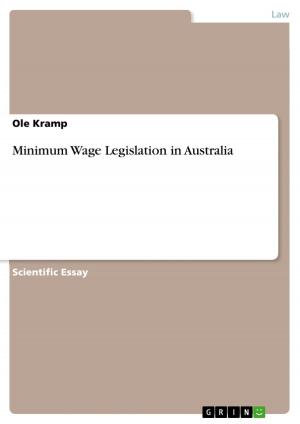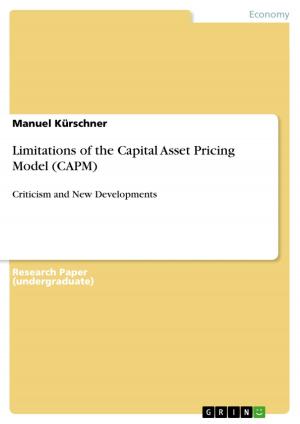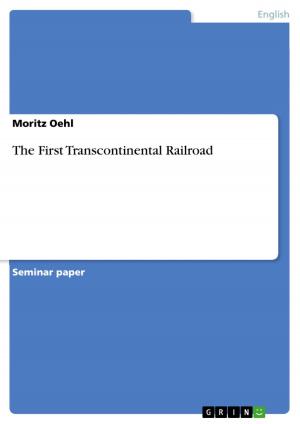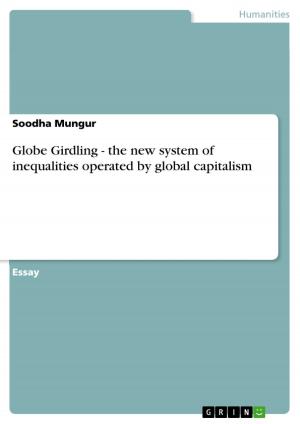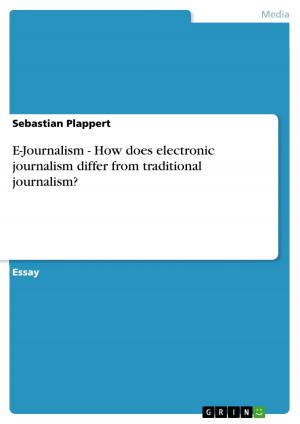'You have no choice but to live in your time' - A Deconstruction of Martin Harrison's poetry collection 'Summer'
A Deconstruction of Martin Harrison's poetry collection 'Summer'
Fiction & Literature, Literary Theory & Criticism, European, German| Author: | Anastasia Louridas | ISBN: | 9783640418701 |
| Publisher: | GRIN Publishing | Publication: | September 3, 2009 |
| Imprint: | GRIN Publishing | Language: | English |
| Author: | Anastasia Louridas |
| ISBN: | 9783640418701 |
| Publisher: | GRIN Publishing |
| Publication: | September 3, 2009 |
| Imprint: | GRIN Publishing |
| Language: | English |
Thesis (M.A.) from the year 2009 in the subject German - Literature, Works, grade: High Distinction 85%, The University of Sydney, language: English, abstract: Martin Harrison's anthology of lyric poetry Summer and the verse prose Music lucidly articulates the disposition of the postmodern poet having no choice but to write in the time in which they are living. His poetry of verse and experimental prose lucidly articulates the angst and dilemmas of living and narrating in the ambiguous epoch of Postmodernity. Paul Cheselka had once commented on the prolific poet Borges: In Borges' poetic cosmovision the most important symbol is time; it is a representation of man and his human condition. Like time, men are in a constant state of flux; they are both forever different and always essentially the same. This is immensely obvious in Harrison's anthology of poetry which mesmerizes the reader through his encapsulating imagery, juxtapositioning of unlikely entities, and experimentation and representation of man in his time. Specifically, Harrison focusses on infinitesimal moments and the ramifications which unfold in a ripple- like effect to convey an ontological appreciation of poetry and poetics which are a product of their respective culture, an aesthetic and evocative pastiche of the time they are written. We notice a disparaging discomfort within these poems, perhaps a semblance of Postmodern disharmony and anxiety infused with the overwhelming nuances of hybridity, which seems to be attributed to the element of time and its influences on the contemporaneous individual, and poetic artist. Harrison, having no choice but to write of the vices and concerns of his time, instigates a melancholic tone, and an overwhelming mood of low modality with an omnipresent yearning for comprehension of what could be definitive of the Postmodern hybrid personage. This examination of human cynicism, and the search for self hood may be attributed to the uncertainties that govern Australian, and Western society of Post- September 11, and the continuance of the Iraqi War. However, in light of this, Harrison is able to induce his concerns with honest self reflection and careful selection of contrary images.
Thesis (M.A.) from the year 2009 in the subject German - Literature, Works, grade: High Distinction 85%, The University of Sydney, language: English, abstract: Martin Harrison's anthology of lyric poetry Summer and the verse prose Music lucidly articulates the disposition of the postmodern poet having no choice but to write in the time in which they are living. His poetry of verse and experimental prose lucidly articulates the angst and dilemmas of living and narrating in the ambiguous epoch of Postmodernity. Paul Cheselka had once commented on the prolific poet Borges: In Borges' poetic cosmovision the most important symbol is time; it is a representation of man and his human condition. Like time, men are in a constant state of flux; they are both forever different and always essentially the same. This is immensely obvious in Harrison's anthology of poetry which mesmerizes the reader through his encapsulating imagery, juxtapositioning of unlikely entities, and experimentation and representation of man in his time. Specifically, Harrison focusses on infinitesimal moments and the ramifications which unfold in a ripple- like effect to convey an ontological appreciation of poetry and poetics which are a product of their respective culture, an aesthetic and evocative pastiche of the time they are written. We notice a disparaging discomfort within these poems, perhaps a semblance of Postmodern disharmony and anxiety infused with the overwhelming nuances of hybridity, which seems to be attributed to the element of time and its influences on the contemporaneous individual, and poetic artist. Harrison, having no choice but to write of the vices and concerns of his time, instigates a melancholic tone, and an overwhelming mood of low modality with an omnipresent yearning for comprehension of what could be definitive of the Postmodern hybrid personage. This examination of human cynicism, and the search for self hood may be attributed to the uncertainties that govern Australian, and Western society of Post- September 11, and the continuance of the Iraqi War. However, in light of this, Harrison is able to induce his concerns with honest self reflection and careful selection of contrary images.


